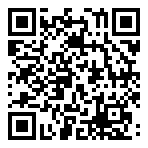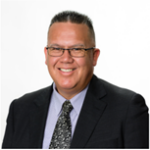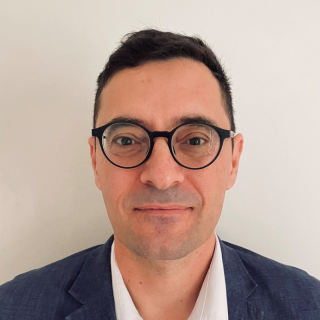INQAAHE Talks on February 12, 2025
Indigenous Knowledge and Quality Assurance: A Global Dialogue
Feb 12, 2025 (Wednesday)
20:00 – 21:30 CET/UTC+1
Online (via Zoom)
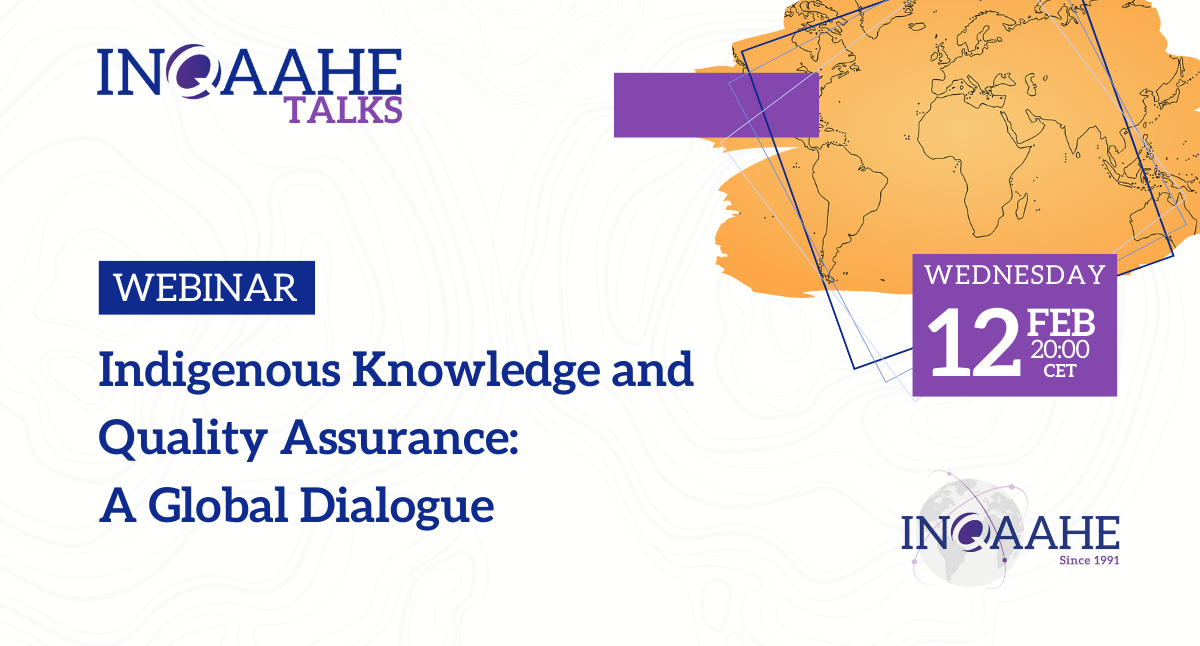
An engaging discussion that delved into the crucial role of indigenous knowledge and education within the higher education landscape. We were honoured to have an illustrious panel representing the experience of indigenous education from around the world to explore how indigenous knowledge is understood in various jurisdictions and the significance of recognizing it in shaping a more inclusive educational framework.
We also examined the criteria for evaluating the ‘quality’ of this knowledge and education, looking at the practices in place to uphold these standards. Additionally, we addressed the challenges faced in acknowledging the contributions of indigenous learning and educational practices, and collaboratively brainstormed strategies to overcome these obstacles.
This discussion was a thought-provoking exploration of the intersection between indigenous knowledge systems and higher education, highlighting the importance of inclusivity, respect, and recognition in enriching the academic experience for all. Contribute your insights and learn from others as we work towards an equitable educational and quality assurance environment.
The following speakers joined us in this session:
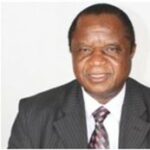 Dr. Hudson Kwandayi
Dr. Hudson Kwandayi
Dr. Hardson Kwandayi is a highly accomplished academic and leader in higher education, with a distinguished career spanning 25 years. Holding a PhD in Higher Education from the University of Arizona (USA) and numerous other qualifications from the University of Zimbabwe, he possesses a diverse and impressive educational background. His expertise encompasses quality assurance, public leadership and management, and public policy analysis. Currently Director of Academic and Institutional Audits at the Zimbabwe Council for Higher Education (ZIMCHE), Dr. Kwandayi previously served as Director of Quality Assurance at Lupane State University in Zimbabwe and also managed the Public Sector Management Training Programme (PSMTP) across 15 Eastern and Southern African countries. The PSMTP was a capacity building programme for senior managers in the public sector in the region and was based at Africa University in Zimbabwe. Dr Kwandayi’s academic contributions extend internationally, with involvement in university academic audits in several countries. Dr. Kwandayi serves on the Executive Boards of Southern African Quality Assurance Network (SAQAN) (as Deputy President) and the African Quality Assurance Network (AfriQAN), further demonstrating his leadership in regional quality assurance. His commitment to excellence is also evident in his role as an adjudicator on the Presidential Innovations Award Panel for universities in Zimbabwe. Finally, Dr. Kwandayi is a member of the Editorial Board of the Journal of Nation-building and Policy Studies (JoNPS) published by Adonis & Abbey Publishers.
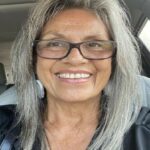 Ms. Bashqwaa’idaamoqwe (Roxanne DeLille)
Ms. Bashqwaa’idaamoqwe (Roxanne DeLille)
Boozhoo Nindinaawemaaganniidoog (Greetings relatives). Bushqwa’idahmooqway indaago (The sound of thunder is what I am named after). Roxanne DeLille indizhi gaakinimiigoo (Roxanne DeLille is what I am known as). Waabizheshii indoodem (I am a member of the Martin clan). Mushkaaziibing indoonjaabaa (I am from Bad River, Wisconsin). Nagaachiwaanong gabegikindaasowigamig indaanoki, Cloquet, Minnesota indaa. (I’m the dean of Indigenous and Academic Affairs at Fond du Lac Tribal and Community College in Cloquet, Minnesota). I am a mother, grandmother, great-grandmother, auntie and active community member. Oldest of 11 children, I am very much a contemporary Anishinaabe woman whose life has been divided between reservation and urban areas. Much the same, my education has been divided between the traditional teachings of my people and mainstream education. I have had the good fortune to sit at the feet of many great teachers and have sat in numerous classrooms, always intrigued by the ways in which we come to understand each other. Following the spirits’ guidance, education was a natural profession. I am currently the Dean of Indigenous and Academic Affairs at Fond du Lac Tribal and Community College in Cloquet, Minnesota USA where I was previously a faculty member. As a faculty member, I taught Communication Studies (Interpersonal/Intercultural Communication) and American Indian Studies for over 20 years. As Dean, I oversee Anishinaabeg Gikindaasowinan (the people’s way of knowing) programs. As an independent consultant, I specialize in leadership and relationship dynamics. As a spiritual consultant I provide numerous ceremonies and teaching sessions in the community. Miiew minik gaagigidooyan, miigwetch bizindaawii’ig (Thank you, I have nothing more to say).
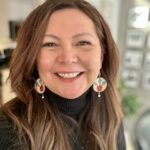 Dr. Stephanie Roy
Dr. Stephanie Roy
Dr. Roy is Anishinaabe kwe, a member of M’Chigeeng First Nation on Manitoulin Island, Ontario, Canada, and is from the Crane clan. A Director of Innovation, Development and Research with the Indigenous Advanced Education and Skills Council (IAESC), she is an experienced director who has worked in the Indigenous education and training sector in Ontario for more than 25 years.
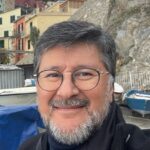 Dr. Alvaro Mauricio Florez Escobar
Dr. Alvaro Mauricio Florez Escobar
Alvaro Florez was born in Bogotá D.C., Colombia in 1966. In 1989 he received his B.S. degree from “Universidad Católica de Manizales” and since 1991 he started his career as professor in Microbiology in the same Higher Education Institution. In 1996 he received his master’s degree in microbiology from “Universidad Pontificia Javeriana”, Bogotá, D.C. and, in 2003 his PhD in Basic Biomedical Sciences-Molecular Biology- from “Universidad de Antioquia”, Medellín. He has several publications in his field and held several academic positions in national and international institutes. He was awarded by Ministry of Science Technology and Innovation from Colombia and by AIDS fellowship from CNR, Naples, Italy. He was a visiting researcher in the Illinois and Duke Universities in the United States and received the gold shield as Graduate who leaves a mark in 2022 by his alma mater. He is now Dean of Faculty of Basic and Biomedical Sciences at Universidad Simón Bolívar, Barranquilla, Colombia. In 2009 he was elected member of the National Inter-Sectoral Commission for Higher Education Quality Assurance CONACES, position that was occupied in the health evaluation room between 2009-2018 and 2019- 2021. Then, in 2022 he was elected as a member of the National Accreditation Council for a five-year term, based on his academic performance, in-depth knowledge, holistic understanding of higher education, ethics, and national and international recognition of academic and scientific communities.
Mr. Alex Bidois
Alex Bidois is the Deputy Chief Executive Māori at the New Zealand Qualifications Authority (NZQA). Two of the key roles of NZQA are to manage the New Zealand Qualifications and Credentials Framework, and to independently check the quality of tertiary education providers, except universities. Alex has worked for over 30 years as a Public Servant in the Aotearoa | New Zealand education system. Alex has a passion that all learners have equitable access to educational success within a context that acknowledges and values their language, culture, and identity.
The session was moderated by:
Dr. Mary Catharine Lennon
Mary Catharine Lennon, PhD, has an academic and professional background in international and comparative higher education research and policy development in areas including system design, accountability, quality assurance, and evaluation. She is the Head of Research, International and Special Projects at the Postsecondary Education Quality Assessment Board of Ontario (PEQAB), a two-term Board Director of the International Network of Quality Assurance in Higher Education (INQAAHE) and chairs the Marjorie Lenn Peace Centre for Research and Capacity Building in Quality Assurance. Dr. Lennon also holds an appointment with the Canadian and International Higher Education Centre at OISE/University of Toronto, where she also lectures on Governance in Higher Education.
